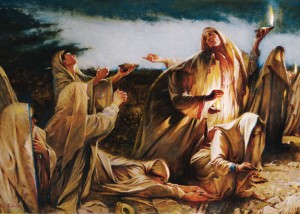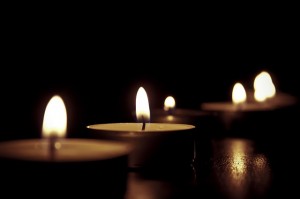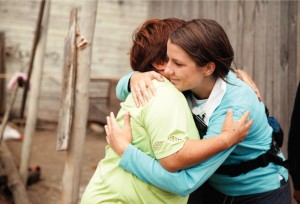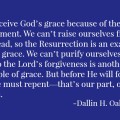As a youth leader, we performed a skit along with the teen-age girls on the parable of the ten virgins. We did it with a modern-day spin, using flashlights. When the five foolish virgins realized their flashlights didn’t work, they came begging the five wise ones for help. One foolish girl said, “Yours has two batteries—couldn’t you give me one?” The wise one answered, “Sorry, this flashlight only works with two good batteries. You need to go buy some.” That simple flashlight taught the parable to me in a way the oil lamps never had.
My grudge against the wise virgins
 It used to bug me as a child when I heard the story of the ten virgins waiting with their oil lamps to greet the bridegroom. I knew it was supposed to be a story about spiritual preparedness, but I couldn’t help thinking the wise virgins were being stingy. The story begins with all ten virgins starting out right—they were willing to meet the bridegroom. He was to meet the women and travel in a procession lit by lamp-light to the wedding. But five were foolish and took their lamps without oil. The other five had filled their lamps with oil. It was late at night when the bridegroom finally came. All the women hastily prepared their lamps, but five of them fell short because they had not prepared their lamps ahead of time. Then, as I interpreted it, at the moment the five wise ones had the opportunity to be charitable by sharing their oil, they did not. They said there wouldn’t be enough for either of them if they did, and they sent them to town to look for their own oil. By the time the five foolish ones returned, it was too late. The procession had passed and the door was closed to them.
It used to bug me as a child when I heard the story of the ten virgins waiting with their oil lamps to greet the bridegroom. I knew it was supposed to be a story about spiritual preparedness, but I couldn’t help thinking the wise virgins were being stingy. The story begins with all ten virgins starting out right—they were willing to meet the bridegroom. He was to meet the women and travel in a procession lit by lamp-light to the wedding. But five were foolish and took their lamps without oil. The other five had filled their lamps with oil. It was late at night when the bridegroom finally came. All the women hastily prepared their lamps, but five of them fell short because they had not prepared their lamps ahead of time. Then, as I interpreted it, at the moment the five wise ones had the opportunity to be charitable by sharing their oil, they did not. They said there wouldn’t be enough for either of them if they did, and they sent them to town to look for their own oil. By the time the five foolish ones returned, it was too late. The procession had passed and the door was closed to them.
I dismissed the parable for years, not being able to reconcile my frustration. After joining the LDS church, I began to study Bible stories again. Through study and by attending Sunday School classes I began to learn what Christ had intended me to learn all along. It took years—and a desire to come to terms with these virgins— before I could fully accept the teaching of this parable. The foundation of this understanding rested on the difference between physical and spiritual preparedness, and the value of a change of heart.
Physical vs. Spiritual Preparedness
 Anyone who has ever experienced a power outage from a natural disaster can understand the importance of being physically prepared. Having candles, a battery-operated radio, extra food and water in the house, and other emergency needs is essential. During the aftermath of Hurricane Sandy, we had five days without electricity. Our gas stove still worked and we had a fireplace, so we could keep warm and even take a hot shower. We had always practiced the habit of keeping extra food and water in the house. Since I love scented candles, we had no shortage of light. It was more of an adventure for us since we had no damage to our home from the storm. My brother-in-law and his family had a different experience. He lives in an area where electricity runs everything in the home. Without it they had no power to run lights, stove, or water. They had to vacate their home. We invited them to stay with us since we had plenty of room. Otherwise they would have needed a hotel for a week. We were happy to help because we were physically prepared.
Anyone who has ever experienced a power outage from a natural disaster can understand the importance of being physically prepared. Having candles, a battery-operated radio, extra food and water in the house, and other emergency needs is essential. During the aftermath of Hurricane Sandy, we had five days without electricity. Our gas stove still worked and we had a fireplace, so we could keep warm and even take a hot shower. We had always practiced the habit of keeping extra food and water in the house. Since I love scented candles, we had no shortage of light. It was more of an adventure for us since we had no damage to our home from the storm. My brother-in-law and his family had a different experience. He lives in an area where electricity runs everything in the home. Without it they had no power to run lights, stove, or water. They had to vacate their home. We invited them to stay with us since we had plenty of room. Otherwise they would have needed a hotel for a week. We were happy to help because we were physically prepared.
Since the parable uses physical objects—oil lamps—to tell the story, it is easy to make the mistake of seeing this as a story about physical preparedness. Oil is a physical commodity that can be bought and sold, given and received. If a person has extra it makes sense that they should share with those in need. But in the Savior’s time, the use of oil lamps was a little more complicated than that. Since we do not use oil lamps to light our way in the night anymore, we can only imagine the arduousness of such a practice. I understand it requires care and patience to even fill the oil lamps, drop by drop. I understand, but I’ve never had to do so. For the women to give of their extra oil would put them in jeopardy of missing the processional. Still, the ones in need were only asking for a small portion. I didn’t understand the implications behind the workings of an oil lamp. Luckily, I understand how a flashlight works.
In our skit, we used batteries to represent the oil. Batteries are also physical items that can easily be bought or sold—or shared. But no matter how hard you try, you cannot get a flashlight to work without a good battery. If your flashlight requires two, it cannot work with only one. The foolish girl asked the wise one to give up one of her batteries. The wise one could not give it to her because she knew how a flashlight worked—it needed both. Thus, she was not being stingy at all. She simply could not give away what she had; otherwise she, too, would be left in the dark.
A change of heart is personal—it comes from within
 With my own spiritual flashlight illuminating my understanding of the parable, I could see clearly now the difference between physical and spiritual preparedness. When we are physically prepared, we can be charitable to others in need and give abundantly of what we have. But being spiritually prepared is quite different. It’s personal. It is the slow and steady change of heart that a person undergoes when they dedicate themselves to Christ. Acts of kindness are habit forming—the more we do, the kinder we become. Obedience to gospel principles takes time—time to learn the principles, time to draw closer to Heavenly Father as we strive to obey, time to see the fruits of our labors. A testimony of the truthfulness of the gospel grows independently—it is planted in the heart of the person willing to seek wisdom and to ask to know the truth of all things. It grows as that seed is nurtured with the good word of God. It bears fruit as you reach out and live your life according to your beliefs.
With my own spiritual flashlight illuminating my understanding of the parable, I could see clearly now the difference between physical and spiritual preparedness. When we are physically prepared, we can be charitable to others in need and give abundantly of what we have. But being spiritually prepared is quite different. It’s personal. It is the slow and steady change of heart that a person undergoes when they dedicate themselves to Christ. Acts of kindness are habit forming—the more we do, the kinder we become. Obedience to gospel principles takes time—time to learn the principles, time to draw closer to Heavenly Father as we strive to obey, time to see the fruits of our labors. A testimony of the truthfulness of the gospel grows independently—it is planted in the heart of the person willing to seek wisdom and to ask to know the truth of all things. It grows as that seed is nurtured with the good word of God. It bears fruit as you reach out and live your life according to your beliefs.
You can develop the qualities of a clean and pure heart within yourself, but you cannot transfer your experiences or the lessons you’ve learned or the testimony you’ve gained to me, simply because you wish to. I need to seek the knowledge on
my own, otherwise it is not mine. If I want a change of heart, I need to place myself in situations that will allow me to grow closer to Heavenly Father. You experiences cannot rub off on me. You cannot give me one of your batteries. I need to find two good ones on my own.
“Let your light so shine before men that they may see your good works and glorify your Father which is in heaven.’ (Matthew 5:16)
When the eyes of my understanding were opened, I felt such relief. It was a burden holding a grudge against the five wise virgins. It also made me realize how important it is for me to live my life like the five wise virgins. If others see my good habits, if others see my love of the Savior, if others feel the spirit emulating from me, they may have the desire to learn where it all comes from—my love of the restored gospel of Jesus Christ. The more we strive to be spiritually prepared, the more others will have the desire to come unto Christ and glorify Heavenly Father in his redemptive plan of happiness.
About Nanette ONeal
Nanette O'Neal loves the gospel and is very happy to share her testimony on LDS Blogs. She is a convert to the church and still feels the spirit burn strong within her heart. She graduated from Mason Gross School of the Arts with a degree in music education and has taught children and adults in the private and public sphere for over twenty years. Nanette continues to study the gospel and the art of writing. She writes weekly inspirational articles on her blog and is currently working on an LDS fantasy novel series, A Doorway Back to Forever. You can find her at NanetteONeal.blogspot.com. Nanette has a wonderful husband, talented son, and three beautiful dogs.








This is the best explanation of the virgins and the lamps I’ve ever seen. Beautifully done!
Loved that. Thank you